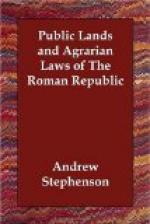In our review of the agrarian agitation we must mention the forceless and insignificant attempt made by the son of Spurius Melius, in 434. Again, in 422, we find that other attempts were made which availed nothing. Yet the tribunes who attempted thus to gain the good will of the people set forth clearly the object which they had in view in bringing forward an agrarian bill. Says Livy; “They held out the hope to the people of a division of the public land, the establishment of colonies, the levying of a vectigal upon the possessors, which vectigal was to be used[25] in paying the soldiers.”
In the year 419, and again in 418, unavailing attempts were made for the division of lands among the plebeians. Spurius Maecilius and Spurius Metilius, the tribunes[26]for the year 412, proposed to give to the people, in equal lots, the conquered lands. The patricians ridiculed this law, stating that Rome itself was founded upon conquered soil and did not possess a single acre of land that had not been taken by force of arms, and that the people held nothing save that which had been assigned by the republic. The object, then, of the tribunes was to distribute the fortunes of the entire state. Such vapid foolishness as this failed not of the effect which the patricians aimed at. Appius Claudius counselled the adoption of the excellent means invented by his grandfather. Six tribunes were bought over by the caresses, flatteries, and money of the patricians and opposed their vetoes to their colleagues who were thus compelled to retire.[27]




